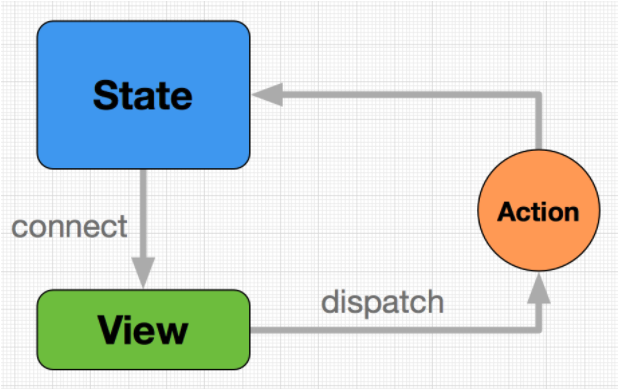公司项目有些用到了
DvaJS[D.va],为了更好的使用,这些调研总结下。
概述
React and redux based, lightweight and elm-style framework.
dva 首先是一个基于 redux 和 redux-saga 的数据流方案,然后为了简化开发体验,dva 还额外内置了 react-router 和 fetch,所以也可以理解为一个轻量级的应用框架。
dva做了三件事
- 把 store 及 saga 统一为一个 model 的概念, 写在一个 js 文件里面
- 增加了一个 Subscriptions, 用于收集其他来源的 action, eg: 键盘操作
- model写法很简约, 类似于 DSL 或者 RoR, coding 快得飞起✈️
可以看出dva主要解决的也是围绕redux的数据流转,同时补充了react-router,fetch。


使用
dva.js
// products-model.js
export default {
// 在全局 state 上的 key
namespace: 'products',
// 初始值,在这里是空数组
state: [],
// 等同于 redux 里的 reducer,接收 action,同步更新 state
reducers: {
'delete'(state, { payload: id }) {
return state.filter(item => item.id !== id);
},
},
subscriptions: {
}
};
// 创建应用,返回 dva 实例
const app = dva({
initialState: {
products: [
{ name: 'dva', id: 1 },
{ name: 'antd', id: 2 },
],
},
});
// 注册视图
app.model(productsModel.default);
app.router(() => <ConnectedApp />);
// 启动应用
app.start('#root');
model复用
dva-model-extend
Utility method to extend dva model.
https://github.com/dvajs/dva-model-extend
import modelExtend from 'dva-model-extend';
const human = {
state: {
stomach: null,
},
reducers: {
eat(state, { payload: food }) {
return { ...state, stomach: food };
},
},
};
const benjy = modelExtend(human, {
namespace: 'human.benjy',
state: {
name: 'Benjy',
},
});
源码
项目使用lerna进行多包管理
├── dva // Official React bindings for dva, with react-router@4.
├── dva-core // The core lightweight library for dva, based on redux and redux-saga.
├── dva-immer // Create the next immutable state tree by simply modifying the current tree
└── dva-loading // Auto loading data binding plugin for dva. :clap: You don't need to write `showLoading` and `hideLoading` any more.
代码量
/packages中JS源码,统计脚本
cloc . --md --exclude-dir=test --include-ext=js
| Language | files | blank | comment | code physical lines |
|---|---|---|---|---|
| JavaScript | 26 | 128 | 110 | 962 |
| ——– | ——– | ——– | ——– | ——– |
| SUM: | 26 | 128 | 110 | 962 |
- sideEffects : false
- 采用ES写法,对于第三方工具,CJS导出
从代码量也可以看出dva封装的很轻。
函数实现
dva()
// packages/dva/src/index.js
export default function(opts = {}) {
const history = opts.history || createHashHistory();
const createOpts = {
initialReducer: {
router: connectRouter(history),
},
setupMiddlewares(middlewares) {
return [routerMiddleware(history), ...middlewares];
},
setupApp(app) {
app._history = patchHistory(history);
},
};
const app = create(opts, createOpts);
//
const oldAppStart = app.start;
app.router = router;
app.start = start;
return app;
...
}
model()
// packages/dva-core/src/index.js
function injectModel(createReducer, onError, unlisteners, m) {
m = model(m);
const store = app._store;
store.asyncReducers[m.namespace] = getReducer(m.reducers, m.state, plugin._handleActions);
store.replaceReducer(createReducer());
if (m.effects) {
store.runSaga(app._getSaga(m.effects, m, onError, plugin.get('onEffect'), hooksAndOpts));
}
if (m.subscriptions) {
unlisteners[m.namespace] = runSubscription(m.subscriptions, m, app, onError);
}
}
subscriptions
// packages/dva-core/src/subscription.js
export function run(subs, model, app, onError) {
const funcs = [];
const nonFuncs = [];
// 循环执行各个订阅函数
for (const key in subs) {
if (Object.prototype.hasOwnProperty.call(subs, key)) {
const sub = subs[key];
const unlistener = sub(
{
dispatch: prefixedDispatch(app._store.dispatch, model),
history: app._history,
},
onError,
);
if (isFunction(unlistener)) {
funcs.push(unlistener);
} else {
nonFuncs.push(key);
}
}
}
return { funcs, nonFuncs };
}
start()
// packages/dva/src/index.js
function start(container) {
// 允许 container 是字符串,然后用 querySelector 找元素
if (isString(container)) {
container = document.querySelector(container);
invariant(container, `[app.start] container ${container} not found`);
}
// 并且是 HTMLElement
invariant(
!container || isHTMLElement(container),
`[app.start] container should be HTMLElement`,
);
// 路由必须提前注册
invariant(app._router, `[app.start] router must be registered before app.start()`);
//
if (!app._store) {
oldAppStart.call(app);
}
const store = app._store;
// export _getProvider for HMR
// ref: https://github.com/dvajs/dva/issues/469
app._getProvider = getProvider.bind(null, store, app);
// If has container, render; else, return react component
if (container) {
render(container, store, app, app._router);
// 热加载
app._plugin.apply('onHmr')(render.bind(null, container, store, app));
} else {
return getProvider(store, this, this._router);
}
}
plugin/use()
dva中对于类的使用只有两个地方,一个是动态加载组件,一个就是插件定义
use(plugin) {
invariant(isPlainObject(plugin), 'plugin.use: plugin should be plain object');
const { hooks } = this;
for (const key in plugin) {
if (Object.prototype.hasOwnProperty.call(plugin, key)) {
invariant(hooks[key], `plugin.use: unknown plugin property: ${key}`);
if (key === '_handleActions') {
this._handleActions = plugin[key];
} else if (key === 'extraEnhancers') {
hooks[key] = plugin[key];
} else {
hooks[key].push(plugin[key]);
}
}
}
}
写在最后
通过源码阅读可以看到dva封装比较浅,但解决了围绕redux的逻辑组织问题,同时提供了路由配置/订阅,插件拓展。

